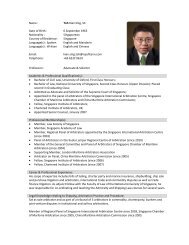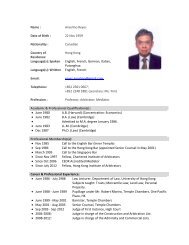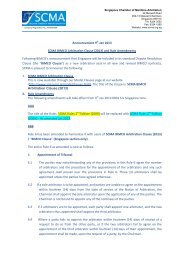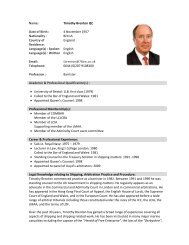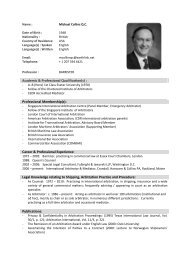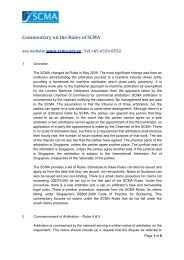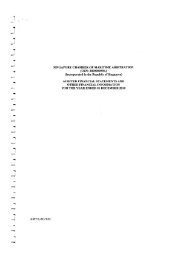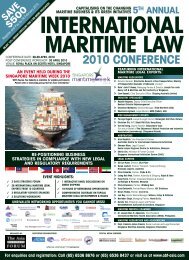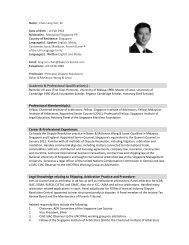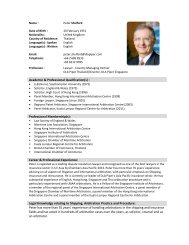here - SCMA
here - SCMA
here - SCMA
You also want an ePaper? Increase the reach of your titles
YUMPU automatically turns print PDFs into web optimized ePapers that Google loves.
SAL Conference 2011<br />
Developments in Singapore Law 2006-2010:<br />
Trends and Perspectives<br />
Speakers & Topics<br />
Intellectual Property Law (cont’d)<br />
Professor George Wei teaches at the School of Law, Singapore Management University w<strong>here</strong> he teaches several courses in trade secrecy, privacy and intellectual and industrial<br />
property rights. Professor Wei has written several books including “Law of Copyright in Singapore” as well as an introductory text on “Life Sciences, Genetic Engineering and<br />
the Law”. Prior to joining SMU in 2005, Professor Wei taught at the Law Faculty of the National University of Singapore. Professor Wei is also a Professorial Fellow of the<br />
Singapore Intellectual Property Academy and he has previously served as a member of the Singapore Copyright Tribunal. Professor Wei’s most recent text publication is entitled<br />
“Some Thoughts on Intellectual Property Rights in Singapore. A Monograph for Professor Gerald Dworkin”.<br />
Developments in Singapore Law, 2006-2010: Copyright<br />
A Return to Basic Principles and Issues<br />
My presentation and paper will focus on copyright law decisions in the period (2006-2010). In particular it will examine how these cases have raised important questions relating<br />
to basic issues and principles in copyright law. These are the application of the expression/idea principle in copyright law, the relationship between primary infringement and<br />
authorization and finally the need to ensure a proper balance of rights and obligations that takes account of the interests of all copyright stakeholders. Cases that I will discuss<br />
include Virtual Maps v Singapore Land Authority, Global Yellow Pages v Promedia as well as Record TV v Media Corp. I will also touch briefly on the Odex decision as well as<br />
some very recent Australian decisions by way of contrast.<br />
Corporations Law<br />
Professor Tan Cheng Han, SC is the Dean of the Faculty of Law at the National University of Singapore. He is also a Specialist Judge, a litigator, and has been appointed arbitrator,<br />
in commercial disputes. His public appointments include being chairman of the Advisory Committee on Move-On and Filming Orders, Commissioner of the Competition Commission<br />
of Singapore, Advisor to the Singapore Taekwondo Federation, member of the Steering Committee to Review the Companies Act, member of the Singapore Youth Sports Development<br />
Committee, member of the Military Court of Appeal, and member of the Appeal Advisory Committee to the Minister for Finance. He is also the author and editor of five books.<br />
Recent Amendments to the Companies Act<br />
Corporations Law is always changing to keep pace with business developments and regulatory trends globally. In October 2007, the Minister for Finance established the Steering<br />
Committee to Review the Companies Act. The Steering Committee is likely to make several important recommendations to modernize Singapore Company Law, building on previous<br />
reform efforts. This session will highlight the important amendments that will be made to the Companies Act and situate them within the broader corporate law context.<br />
Associate Professor Pearlie Koh teaches at the School of Law, SMU. The<br />
courses she has taught include company law and law of business organisations.<br />
She researches and writes mostly in company law.<br />
Associate Professor Lan Luh Luh teaches at the Faculty of Law and the<br />
Business School, NUS and is the Co-Director, Corporate Governance and<br />
Financial Reporting Centre. She has a PhD and LLB from NUS and a LLM from<br />
Cambridge. She lectures in corporate finance law, company law and corporate<br />
governance.<br />
Directors’ Duties and Minority Oppression<br />
Recent cases on directors’ duties have focused on the breach of fiduciary duties on the assumption that all directors’ owe the same duties. Can it, however, be argued that the scope of directors’<br />
duties should be calibrated according to the particular factual matrix in which the alleged breach occurred In minority protection, we consider, in the light of recent cases, the construction of s<br />
216, and on the relationship between s 216 and s 254(1)(i). We look also at quasi-partnership.<br />
Professor Hans Tjio has taught at the Faculty of Law, NUS since 1990, and is currently the Director, Centre for Commercial Law Studies. He has degrees from Cambridge and<br />
Harvard, and lectures in securities regulation, company law, trusts and equity.<br />
Credit and Securities: Form, Substance and Extrinsic Evidence<br />
Many traditional legal concepts have struggled in the financial markets. This paper will examine local cases and developments that have dealt with risks in the credit and securities<br />
markets. The issue often appears to be whether to characterize a transaction as a sale or loan, regulated money-lending or otherwise, which has caused courts some difficulty.<br />
Even greater problems exist with complex financial documentation, particularly when this is overlain with extrinsic statements.<br />
Mr Lee Eng Beng, SC headed Rajah & Tann LLP’s Business Finance and Insolvency Practice Group from 2003 until 2009, and was appointed Senior Counsel in 2008. He assumed<br />
the position of the firm’s Joint Managing Partner in 2010. He continues to maintain an active legal practice in insolvency, banking and commercial litigation, debt restructuring,<br />
and commercial arbitration.<br />
Schemes of Arrangement: Singapore-Styled Debt Restructuring<br />
The scheme of arrangement procedure continues to be widely used in Singapore to facilitate debt restructuring exercises, and a number of Singapore cases count as leading<br />
authorities on the subject. The Singapore courts have been robust in ensuring the effectiveness, expediency and utility of schemes of arrangement in debt restructuring. A<br />
distinctive local approach has developed. However, fundamental issues remain unresolved and the struggle to find the right balance between debtor and creditor continues.





